St John Chrysostom – Prince of Preachers – Nov 13 I Mar Ivanios the Golden Mouthed Bishop
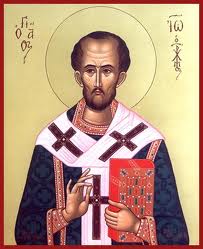
Saint John Chrysostom is ranked among the greatest Fathers, greatest Teachers, and Doctors of the Church. His gifts of eloquence of speech, fluency of languages, in-depth writings and interpretations, as well as his piety and courageous spiritual nature have made the greatness of this saint legendary. A greatly gifted Mar Ivanios used simple examples to teach hard to grasp ideas of the Scriptures. St. John Chrysostom, a man of holiness has been confined only to the Seminaries and theologians. The common people do not seem to have heard too much about him or his words.
He was born in Syria in the city of Antioch in the year 347AD, to a prosperous father, Secundus, a commander-in-chief of the imperial troops of the Syrian army in Antioch and a very righteous mother, Anthusa, who was known for her devotion to the Lord. His father died soon after the birth of John and his mother chose not to marry again even though she was only twenty years of age. She gave all her attention to bringing up John and an elder sister. She was a woman of intelligence and character, who instructed her son in piety and provided John with the most knowledgeable masters within the Syrian Empire. She sent him to the best schools of Antioch and studied Greek Wisdom in the city of Athens. He surpassed his classmates in knowledge and in virtue. John received his literary training from Philosopher Anthrathius. He then studied law. He was prepared for a career in law under the renowned rhetorician Libanius, who was a teacher of St Basil, the Great, St Gregory of Nazianzus and who marvelled at his pupil’s eloquence and foresaw a brilliant career for his pupil as statesman and lawgiver. Eloquence was esteemed the highest accomplishment, and this was studied during his young years. Even in his youth he greatly excelled his masters.
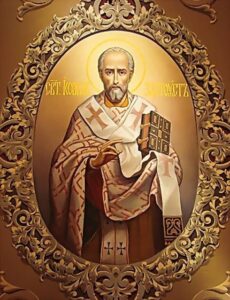
After the death of his mother, Chrysostom fled from the seductions and tumults of city life to the monastic solitude of the mountains south of Antioch, and there spent six happy years in theological study and sacred meditation and prayer. His young heart was deeply concerned with the plight of the poor and he gave all his inherited riches to the poor and those in need. A very decisive turning point in the life of Chrysostom was, when he met one day (AD 367) the bishop Meletius. The earnest, mild, and winning character of this man captivated Chrysostom in such a measure that he soon began to withdraw from classical and profane studies and to devote himself to an ascetic and religious life. He left the study of law and attended a school for monks and forsook the vanities of the world choosing to enter the hermetic community life, in the order of St Pachomios. He entered a monastery which served to educate him in preparation for his ordination as a priest in 386 AD. Monasticism was to him (as to many other great teachers of the Church) a profitable school of spiritual experience and self-government.
Meletius, Patriarch of Antioch ordained John deacon in 381, under Flavin. The following Patriarch of Antioch ordained John Chrysostom priest in 386 AD, at the age of 40. Emperor Arcadius summoned Saint John Chrysostom and made him Patriarch. In 398 AD His Holiness Bishop Theophilus, of Egypt, arrived at Constantinople and consecrated Saint John Chrysostom “Bishop of the See of Constantinople” (Patriarch).
St. John Chrysostom was a father to the poor, neither concerned for the dignity of the position nor the comforts of life. Justice was his favourite themes, especially the justice due to the poor by the rich. History records this blessed saint as trimming the expenses of the patriarchate to a minimum as never before known, and the sums of money saved were given to the poor.
From the pulpit there emerged John, a preacher whose oratorical excellence gained him a reputation throughout the Christian world, a recognition which spurred him to even greater expression that found favour with everyone. The grace of the Lord inspired Saint John Chrysostom to write many homilies, sermons, and interpret vast numbers of books while he was a young deacon. He is known today as one of the greatest and beloved preachers to ever preach and a large number of his sermons still exist today. He built schools and hospitals, raised the standards of the priesthood, visited the sick and poor on foot, and acquired many enemies among the rich and powerful, because of his mission for the poor.
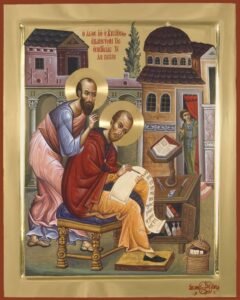
The wife of the emperor, who made St John Chrysostom patriarch, had a great desire for wealth. She once forcefully took a garden, which belonged to a poor widow. The widow went to St John with her misfortune. St John asked the emperor’s wife to return the garden to its true owner. She did not obey, and St John prevented the emperor’s wife from entering the Church and partaking of the Holy Communion. The emperor’s wife had St. John Chrysostom excommunicated. He was exiled to the Island of Treace. The people became greatly enraged with St John’s exile and gathered around the emperor’s palace demanding the return of their patriarch. A severe earthquake shook the city almost destroying it. Taking this as a sign of God’s displeasure with the exile, the emperor’s wife asked the emperor to bring back St. John.
Saint John Chrysostom’s life was to always be full of struggle. St John ardently attacked the behaviour, dress and adornment of the upper class, particularly the women. Christians boldly attended races on Good Friday and games in the stadium on Holy Saturday. He constantly battled this immorality and sin and courageously preached against these behaviours openly in his sermons. His enemies together with the emperor’s wife, who took his morality issues as a personal attack, accused him falsely before the emperor and he was once again exiled. He was provided no minimal comforts and was moved from place to place in untoward weather conditions so his health would deteriorate quickly on route to Comana, his place of exile. St. John died in poor health, in Turkey on November 13, 407. Having been dressed in white garments by the clergy of the chapel of Saint Basilicas a short time after receiving the Holy Communion Saint John Chrysostom truly departed in peace. “Glory be to God for all things” was the last words uttered by the great saint. Truly, glory was brought to God through the life led by this gifted and great saint, a life golden from youth.
A terrible hailstorm fell on Constantinople when he died. Four days later, the evil empress died too. Her son honoured St. John’s body and showed how sorry he was for what his mother had done. During the reign of Theodosius II, the son of Emperor Arcadius (the emperor who exiled St John), his holy body was taken back to Constantinople where it was placed in the Church of the Apostles.
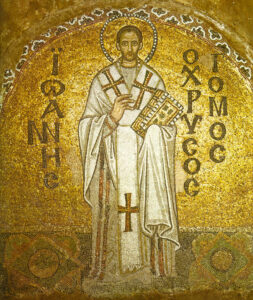
St. John Chrysostom’s name literally meant “Golden Mouth.” A simple woman, who heard his sermons, gave him this title. The zeal and clarity of his preaching, which appealed especially to the common people, earned him the Greek epithet Chrysostomos, means ‘golden-mouthed’ and denotes his celebrated eloquence. He lived up to his famous name from an incredibly young age. St. John was a wonderful bishop. Although he was always sick, he accomplished a tremendous amount of good. He preached once or twice every day, fed the poor and took care of orphans. He corrected sinful customs and stopped bad plays from being performed. He loved everyone, but he was not afraid to tell even the empress when she did wrong. He preached that what God wanted was not so much golden chalices but golden souls.
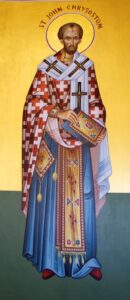
“The grace of your mouth which has shone like a beacon, has illumined the universe; it stored up in the world treasures of the absence of avarice; it showed to us the height of humility. Therefore, instructing by your words, O Father John Chrysostom, intercede with the Word, Christ our God, that our souls may be saved.
The Orthodox Syrian Church commemorates St John Chrysostom in the 5th Thubden and on November 13
Quotes of St John Chrysostom – The Golden Mouth Bishop – Nov 13
- If you cannot find Christ in the beggar at the Church door, you will not find Him in the Chalice.
- The bee is more honoured than other animals, not because she labours, but because she labours for others.
- Let us always guard our tongue; not that it should always be silent, but that it should speak at the proper time.
- Prayer is the place of refuge for every worry, a foundation for cheerfulness, a source of constant happiness, a protection against sadness.
- Not to share our own wealth with the poor is theft from the poor and deprivation of their means of life; we do not possess our own wealth, but theirs.
- “We are commanded to have only one enemy, the devil. With him never be reconciled! But with a brother, never be at enmity in thy heart.”
- No matter how just your words may be, when you speak with anger, you ruin all: no matter how boldly you speak, how fairly reprove, or what not.
- The road to Hell is paved with the bones of priests and monks, and the skulls of bishops are the lamp posts that light the path.
- Happiness can only be achieved by looking inward & learning to enjoy whatever life has and this requires transforming greed into gratitude.
- Sin is the wound; repentance is the medicine. Sin is followed by shame; repentance is followed by boldness [ Boldness means to beg God for undeserved mercy]. Satan has overturned this order and given boldness to sin and shame to repentance.
- Be ashamed when you sin, don’t be ashamed when you repent [To repent means to have a change of heart and mind. It is not simply a feeling of sorrow, but a psycho/spiritual growth away from evil/death and a turning to God/life].
- There is nothing colder than a Christian who does not seek to save others.
- When you are weary of praying, and do not receive, consider how often you have heard a poor man calling, and have not listened to him.
- To destroy the foetus’ is something worse than murder.’ The one who does this ‘does not take away life that has already been born, but prevents it from being born.’
- When we teach our children to be good, to be gentle, to be forgiving (all these are attributes of God), to be generous, to love their follow men, to regard this present age as nothing, we instil virtue in their souls, and reveal the image of God within them.
- The rich man is not one who is in possession of much, but one who gives much.
- I am a Christian. He who answers thus has declared everything at once-his country, profession, family; the believer belongs to no city on earth but to the heavenly Jerusalem.
- We must not mind insulting men, if by respecting them we offend God.
- Only those who do not fight are never wounded.
- It is impossible to be saved without the help of the Most Blessed Virgin, because those who are not saved by the justice of God are saved by the intercession of Mary.
- Such is friendship, that through it we love places and seasons; for as bright bodies emit rays to a distance, and flowers drop their sweet leaves on the ground around them, so friends impart favor even to the places where they dwell. With friends even poverty is pleasant. Words cannot express the joy which a friend imparts; they only can know who have experienced. A friend is dearer than the light of heaven, for it would be better for us that the sun were exhausted than that we should be without friends.
- Nothing causes us to resemble God so nearly as the forgiveness of injuries.
- We are commanded to have only one enemy, the devil. With him never be reconciled! But with a brother, never be at enmity in thy heart.
- It is better to err by excess of mercy than by excess of severity. Wilt thou become a Saint? Be severe to thyself but kind to others.
- Poor human reason, when it trusts in itself, substitutes the strangest absurdities for the highest divine concepts
- Do you fast? Then feed the hungry, give drink to the thirsty, visit the sick, do not forget the imprisoned, have pity on the tortured, comfort those who grieve and who weep, be merciful, humble, kind, calm, patient, sympathetic, forgiving, reverent, truthful and pious, so that God might accept your fasting and might plentifully grant you the fruits of repentance.
0 Comments